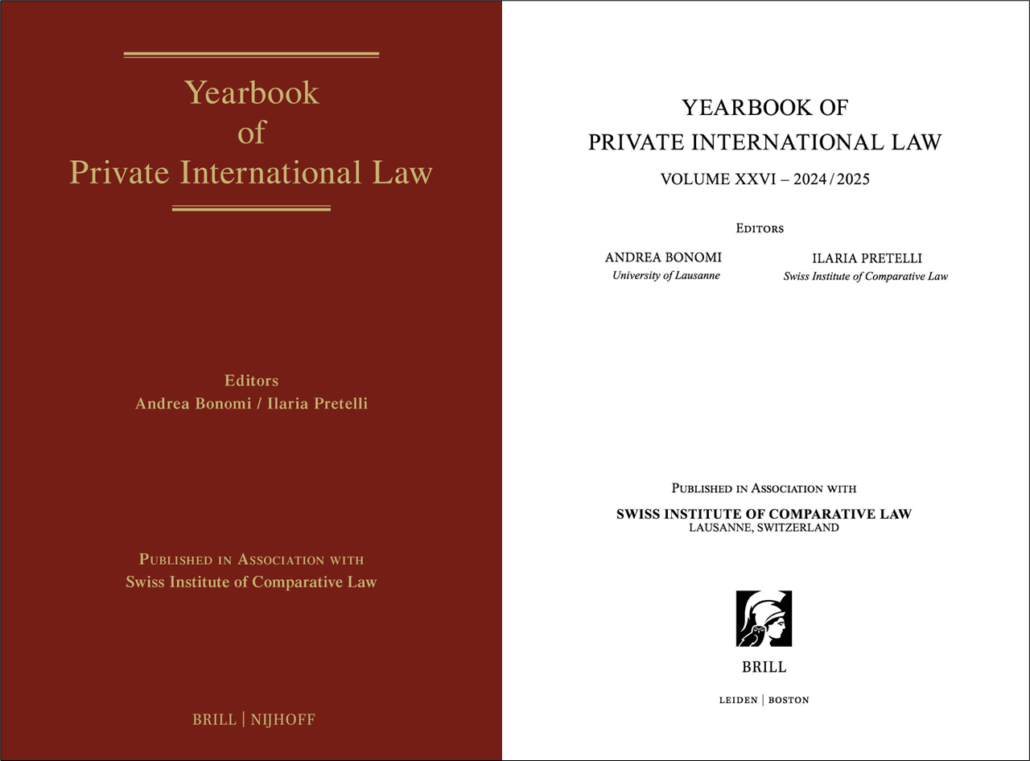Views
French Supreme Court upholds asymmetric jurisdiction clauses in Lastre follow-up
by Jean-Charles Jais, Guillaume Croisant, Canelle Etchegorry, and Alexia Kaztaridou (all Linklaters)
On 17 September 2025, the French Cour de cassation handed down its decision on the Lastre case. This followed a landmark preliminary ruling of February 2025 from the CJEU, which laid out the conditions for a valid asymmetric jurisdiction clause under article 25 of the Brussels I recast regulation.
Asymmetric jurisdiction clauses allow one party to initiate proceedings in multiple courts or any competent court, while the other party has fewer options or is restricted to a specific jurisdiction. Such clauses are common in financial agreements (read more in our previous blog post here).
In the latest development of the Lastre case in France, the French Supreme Court opted for a pro-contractual autonomy stance, favouring the validity of asymmetric jurisdiction clauses.
Using Foreign Choice-of-Law Clauses to Avoid U.S. Law
Can private actors utilize choice-of-law clauses selecting the laws of a foreign country to avoid laws enacted by the United States? In this post, I argue that the answer is a qualified yes. I first examine situations where the U.S. laws in question are not mandatory. I then consider scenarios where these laws are mandatory. Finally, the post looks at whether private parties may rely on foreign forum selection clauses and foreign choice-of-law clauses—operating in tandem—to avoid U.S. law altogether.
Read more
Civil Personal Status Law Litigation in the UAE – Between Lofty Ideals and Sour Realities

I. Introduction
It is not uncommon for scholars to debate whether private international law is needed as a distinct discipline, and whether it is truly indispensable. After all, could one not save the effort and complexity of applying foreign law by simply treating all cases as purely domestic? From a theoretical standpoint, the answer is yes, since no State is under an inherent obligation to apply foreign law. Yet, such an approach entails serious shortcomings, particularly when it comes to respecting vested or acquired rights, meeting the legitimate expectations of the parties, and fostering cross-border commerce. It follows that the costs of refusing to recognize and apply foreign law are far greater than the difficulties associated with maintaining a system of private international law. It is therefore unsurprising that private international law has established itself as a common language for managing the legal diversity inherent in transnational relations. Read more
News
HCCH Monthly Update: December 2025
HCCH Monthly Update: December 2025
Membership
On 4 December 2025, Indonesia applied to become a Member of the HCCH. On the same day, the Secretary General of the HCCH opened the six-month voting period during which all current Members of the HCCH may cast their vote on the proposal. Following this voting period, and provided a majority of votes are cast in favour, Indonesia will be invited to become a Member by depositing an instrument of acceptance of the Statute of the HCCH. More information is available here.
Meetings & Events
On 1 December 2025, the third meeting of the Working Group established to finalise the Good Practices document relevant to the 1965 Service, 1970 Evidence, and 1980 Access to Justice Conventions was held online. More information is available here.
From 2 to 4 December 2025, the Experts’ Group on Carbon Markets met for the third time, continuing its study of the private international law issues arising from carbon markets. More information is available here.
On 10 December 2025, the third Post Adoption Services Workshop was held online, hosted by the Central Authority of Canada under the 1993 Adoption Convention. The event had over 120 participants from over 35 Contracting Parties to the Convention. More information is available here.
On 11 December 2025, the Permanent Bureau (PB) of the HCCH hosted a book launch for the publication of The Hague Convention on Choice of Court Agreements: A Commentary, in celebration of the tenth anniversary of the entry into force of the 2005 Choice of Court Convention. More information is available here.
Other Developments
The PB of the HCCH has launched a public consultation on the Draft Text of a possible new convention on parallel proceedings and related actions, to be held from 18 November 2025 to 26 January 2026. Experts, practitioners and judges from diverse legal traditions with experience in cross-border litigation and private international law more broadly are encouraged to participate in the consultation. More information is available here.
On 23 December, the PB of the HCCH announced the conclusion of the e-Country Profiles project, resulting in the development and modernisation of online Country Profiles for a number of key HCCH Conventions. Contracting Parties to these Conventions can now easily publish legal and practical information about their implementation of these instruments, making the e-Country Profiles a valuable tool for use by public authorities, legal practitioners and other interested parties. More information is available here.
These monthly updates are published by the Permanent Bureau of the Hague Conference on Private International Law (HCCH), providing an overview of the latest developments. More information and materials are available on the HCCH website.
The Role of Precedents in Final Appeal Proceedings: Germany, Israel, USA — Panel Discussion (On-Site/Remote), Bonn, 20 January 2026, 6 p.m. German time

The Regional Hubs Bonn, Cologne and Düsseldorf of the German-American Lawyers’ Association (DAJV), together with the German-Israeli Lawyers’ Association (DIJV), the leading law firm Redeker Sellner Dahs and the University of Bonn, invite to a panel discussion at the Bonn offices of Redeker Sellner Dahs.
Germany has recently introduced a “precedent procedure” (“Leitentscheidungsverfahren”) in the German Code of Civil Procedure (“Zivilprozessordnung”, ZPO). The new legislation, only applicable if the outcome is relevant to a “multitude” (“Vielzahl”) of other proceedings, entered into force on 31 October 2024. On that very day, the German Federal Court of Justice (Bundesgerichtshof) immediately made use of this new tool and elevated to a “precedent procedure” a pending litigation against Facebook on damages for immaterial harm from “scraping” according to Article 82 European General Data Protection Regulation (“Scraping Complex”). This was to ensure that the Court be able to deliver an opinion on the relevant question of law even if the parties were to settle the case meanwhile. In the following, the parties did not settle, and the Court delivered its regular judgment soon afterwards, on 18 November 2024. Since then, the Court has not yet used this tool again, as it seems.
Germany is a civil law jurisdiction where, formally speaking (and leaving some exceptions aside), there are no binding precedents. Yet, there has been a long debate on “persuasive precedents”, i.e. the expectation and practice that lower courts follow the judgments of the Federal Court of Justice (and other highest courts), unless they put forward thorough legal reasoning for departing. A plethora of fundamental and practically relevant questions arises in this context: Do judgments of the courts create “law” or do they merely tell us what the law says that the legislator enacted? What, if any, are the constitutional constraints on judicial development of the law? Is the concept of “persuasive precedents” a satisfactory calibration between rendering justice in the individual case and stability of the legal system? What is the status of an opinion of the German Federal Court of Justice in the new precedent procedure in this context? Why does it only cover cases with relevance to a multitude of other proceedings? Is this “multitude” the same as the relevance of the point in law for a “multitude” of cases to grant access to first and final appeal (“fundamental relevance” [“grundsätzliche Bedeutung”])? What is the role of the three layer appeal system in its entirety in this regard? How does the independence of the judiciary come into play and how does this institutional guarantee relate to available disciplinary measures against “slow” and “ineffective” judges? To what extent do judges tend to discipline themselves by following precedents to promote themselves for higher-ranking posts?
All of these questions are highly relevant in other jurisdictions as well, but they are placed in fundamentally different contexts. Israel is a mixed jurisdiction with elements from common law and civil law. How do the Israeli Supreme Court and the lower courts deal with these issues? What is the law-making role of the Supreme Court in the context of constitutional tradition and practice? Is it advisable to combine the function of final appeal with judicial review of the executive and legislative branches of the state? Is there a particular politicization of final appeal proceedings as well, next to this trend in regard to judicial review proceedings? What effect should the role of precedents have on the procedure of appointing judges to the Supreme Court? Similar questions appear with a view to the United States, but there these questions are placed within a common law context. Having regard to recent decisions of the Supreme Court, how binding is precedent, and when can it be overturned? Also, what is the purpose of the “shadow docket”, and what does its apparently increased use signify in current Supreme Court practice? How important is precedent for the rule of law?
These and other questions will be addressed by a distinguished panel that represents the three jurisdictions and diverse perspectives:
Panelists:
Dr Thomas von Plehwe, Attorney admitted to the Bar of the German Federal Court of Justice (“Rechtsanwalt beim Bundesgerichtshof”), Karlsruhe, Germany.
Professor Barak Medina, The Landecker-Ferencz chair in the study of Protection of Minorities and Vulnerable Groups, Hebrew University Jerusalem, Israel.
Professor Russell A. Miller, J.B. Stombock Professor of Law, Washington & Lee School of Law, Lexington, USA.
Moderators:
RA Professor Dr Peter Andreas Brand, Redeker Sellner Dahs Rechtsanwälte, Berlin Offices.
Professor Dr Matthias Weller, Mag.rer.publ., MAE, Director of the Institute for German and International Civil Procedural Law, Regional Board Member for Bonn of the DAJV.
The venue is Willy-Brandt-Allee 11, 53113 Bonn. Participation is possible on site or via video conference.
We are looking forward to seeing you there!
Registration at sekretariat.weller@jura.uni-bonn.de




